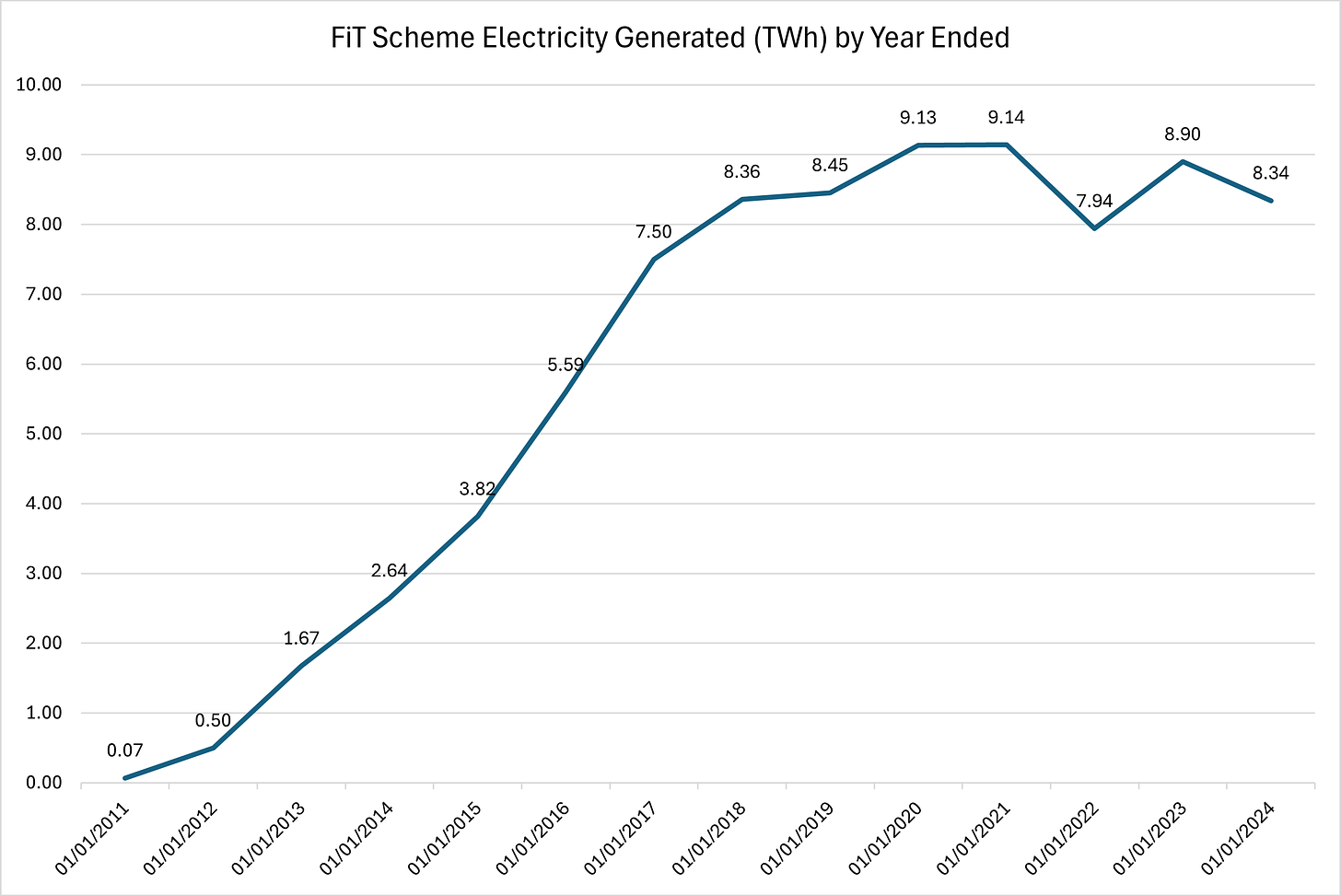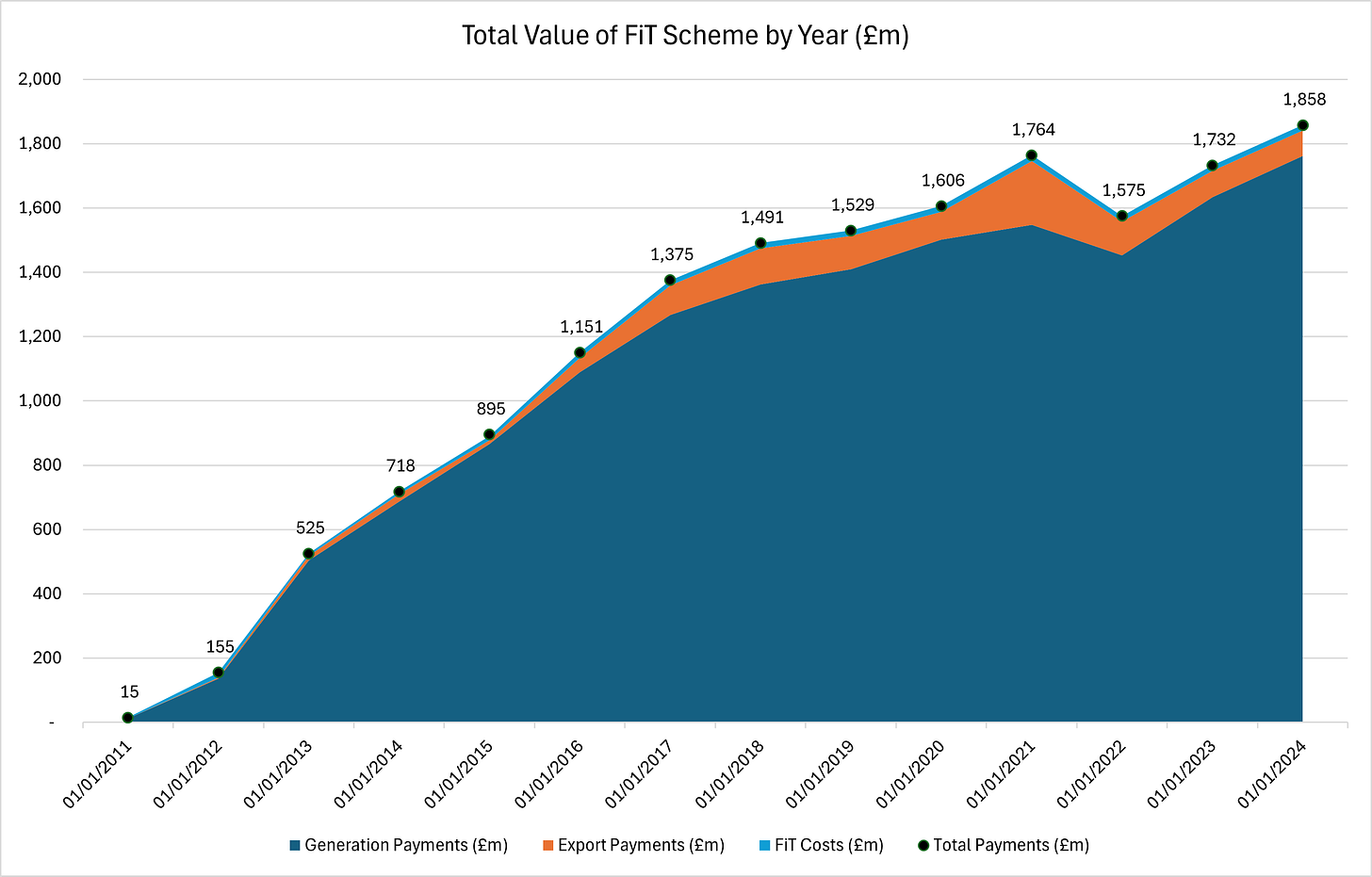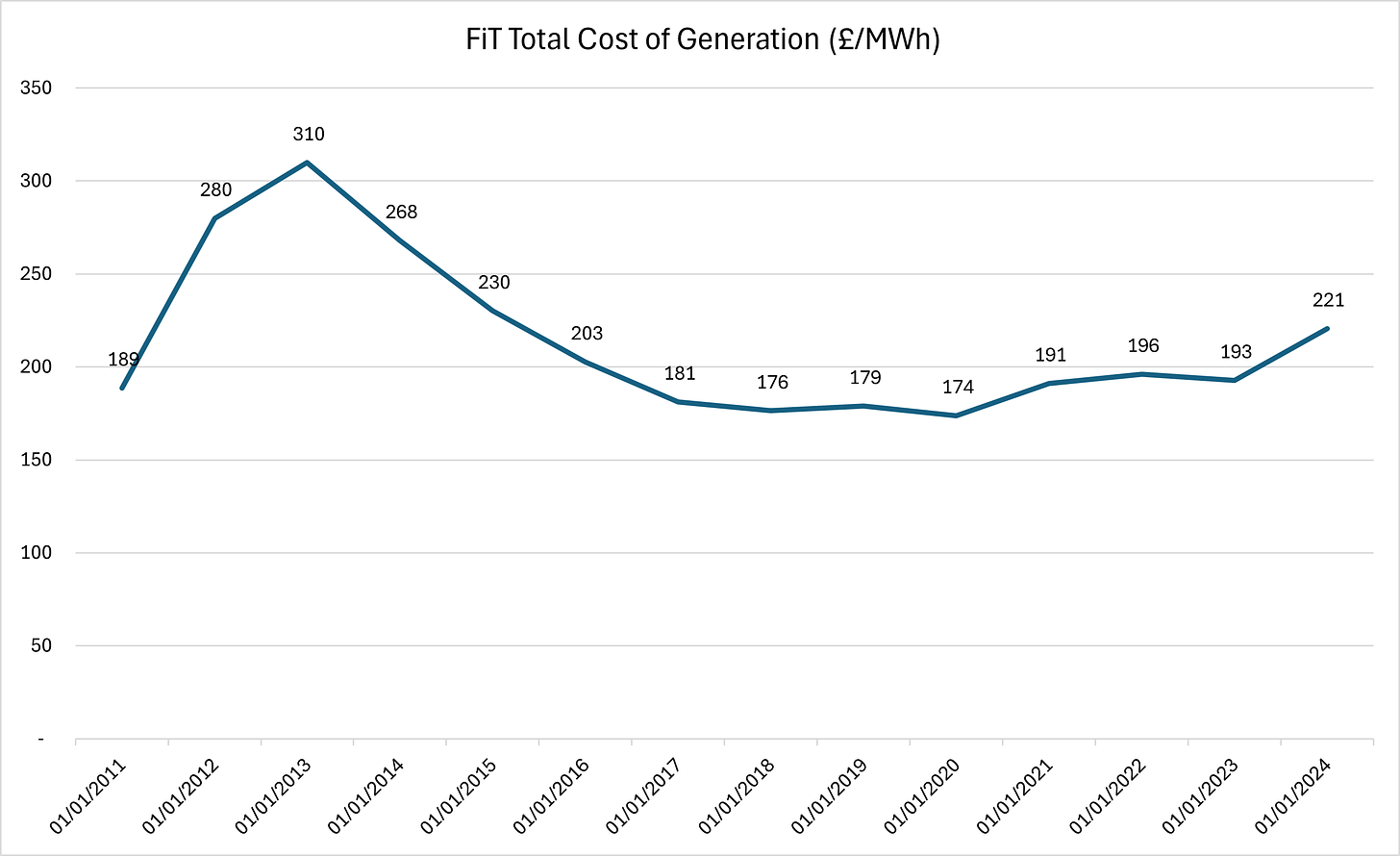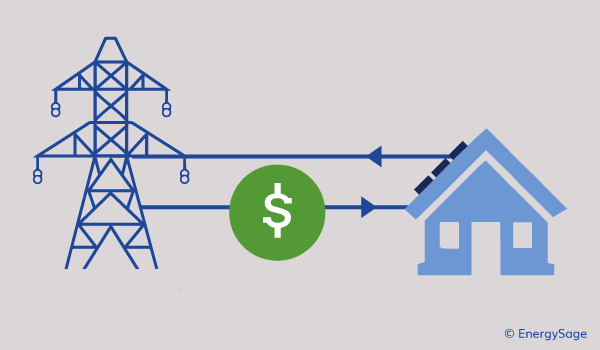In the run up to Christmas, Ofgem published its latest report on the Feed-in-Tariff (FiT) scheme. Despite falling electricity generation, payments under the scheme reached a record £1.84 billion, and the total cost of the scheme reached £1.86 billion. This article walks through the key statistics from the latest report.
Feed-in-Tariff Generation
Solar power makes up nearly 99% of the number of FiT installations and over 79% of installed capacity. Ofgem does not provide a breakdown of actual generation by technology, but we can safely assume that solar produces the bulk of output. As Figure 1 shows, generation fell by 6.3% to 8.34 TWh in FY 2023/24.

It appears that generation under the scheme peaked in the year ending March 2021 and is now on a gentle glide path downwards. This may be due to around 467 installations becoming inactive since 2021/22. However, even though the FiT scheme has been closed to new entrants for some time, 928 new installations have been accredited in the same period. It seems that the older installations are slowly degrading and producing less each year.
Feed-in-Tariff Payments
Payments under the scheme are split into three elements. The largest element was £1,762 million paid for generating electricity. An additional £78 million was paid for electricity exports, and a further £18 million was paid to licensees for administering the scheme. As shown in Figure 2, the total value of the scheme increased by 7.2% to £1,858 million, a new record. This is the equivalent of about £65 per household. These charges disproportionately impact the poorest in society and benefit the rich who could afford to put solar panels on their roofs.

The total cost of the scheme has now reached £16,389 million since its inception. Interestingly, the second-largest licensee under the scheme is Good Energy, which paid out a total of over £260 million in 2023/24. This means that Good Energy is probably one of the largest recipients of the FiT administration fees. By pure coincidence, I am sure, the CEO of Good Energy is Nigel Pocklington, who just happens to be the brother of Jeremy Pocklington, who is the Permanent Secretary at DESNZ.
Cost of Feed-in-Tariff Generation
As shown in Figure 3, increased payments coupled with reduced generation has meant that the cost per MWh of generation has soared.

The total cost of generation (generation plus export) rose by 14.5% to £221/MWh. This is because the FiT payments are index-linked and increase each year in line with the Retail Price Index. The average payment peaked at £310/MWh in 2012/13, then fell to £174/MWh in 2019/20 as new installations attracted lower subsidies. However, now that very few new installations are coming online, prices are rising and are now higher than at any point since 2014/15.
This latest cost per MWh compares to the cost of currently active Contracts for Difference (CfDs) for offshore wind at about £150/MWh, onshore wind at £113/MWh and solar at £110/MWh. The average market reference price so far this financial year is about £69/MWh. We are being forced to pay more than three times the market rate for uncontrollable, mostly solar power.
Conclusions
We can expect the cost of the Feed-in Tariff scheme to continue at very high rates for the foreseeable future. The duration of FiT contracts is 20-25 years, and if the rate of inflation stays above the rate of decay of generation, the overall cost will continue to increase.
However, we can expect the cost per MWh of generation to keep rising, and we will continue to pay over the odds for electricity until the country goes bust. We really need our politicians to prioritise cheap energy over almost everything else instead of signalling their green virtue on the world stage.
David Turver writes the Eigen Values Substack, where this article first appeared. He will be giving a Sacred Cows talk on January 28th in London entitled “Net Zero: Why the cure is worse than the climate change disease”. More details and ticket details can be found here.












To join in with the discussion please make a donation to The Daily Sceptic.
Profanity and abuse will be removed and may lead to a permanent ban.
Well the WHO doesn’t have an army so any “power” is ceded to it voluntarily by member states- by the governments of member states who find that the WHO is a useful thing to hide behind
I am not a fan of power grabbing globalist accords which is why I am a big fan of Trump for withdrawing from the Paris Agreement. I don’t care if Trump is loud, obnoxious, or not a very nice man according to bleating Liberals ——I believe Maradona was an asshole according to many. But was that important at all to Napoli or Argentina fans? NO——WHO power grabbing should be stopped yes, but who is going to stop it? Our squirming politicians sign up to everything.
The left is so deranged about Trump, that if the Don said he liked breathing, the dems would hold their breath.
Now there’s an idea.
The only non-medical doctor to be appointed WHO chief honcho, Tedros appointed Robert Mugabe as a ‘WHO Goodwill Ambassador.’ Has formed relationships with Bill Clinton and his Clinton Foundation, and The Bill and Melinda Gates Foundation. In light of the crises in Yemen, Ethiopia, Syria and Afghanistan not receiving, in his view, sufficient coverage, claimed this was a result of bias against non-white lives. Reappointed unopposed for a second term in 2022. What could possibly go wrong giving this fox the keys to the hen house?
Real pandemics since the middle ages can be counted on one hand.Why do we need to rush to give special powers for something that happens on average about once every 200 years.
Thanks. A point I have made many times here on DS.
Because the historical frequency may be about to ‘go for a ball of chalk’ with Tedros at the helm. His behind-the-scenes manipulators are the ones who seek to mould the future to their will. ‘Real pandemics are so passe. Engineered, bogus ones are the future.
I know that is the fear. Any engineered pandemic is a crime against humanity, as we have seen. Anyone who has caused or facilitated it, should be hanged. Of course they are too powerful to end their lives on a rope, or are they.? Never say ‘never’.
I read somewhere that financial crime does not have the death penalty, I wonder why!
Malaria is the No1 killer so if they were genuinely “concerned” they would focus their energies on that.
Because they have plans to make them a great deal more frequently.
FFS There will never be a pandemic caused by a virus tweaked by man or naturally occurring. Humanity has a superb immune system – although that is now subject to harm by mRNA jabs.
Bubonic plague/black death bacterial and now curable.
Spanish Flu – very probably caused by the good old USA “vaccinating” over 3 million unfortunate soldiers at Fort Detrick basically trashing their immune systems letting URI’s loose on the world. Just think about that vax programme – immunising exactly how – against a pathogen which apparently turned out to be a virus.
The only pandemic we have ever had was/is one of fear, caused quite deliberately and in cold blood by the RPTB and sadly still ongoing in far too many minds.
The WHO apart,who benefits? – China and the Elites.
Who was harmed? – mainly the West/Far East Capitalist countries..
Spanish flu from what I heard spared kids and took down healthy adults in their prime? Also many returning from WW1 malnourished must’ve played its part.
“Countries would also agree to limit criticism of the WHO in order to “combat false, misleading, misinformation or disinformation”…..That got me thinking of Neil Oliver and his full show now on Youtube (that is controlled by WHO on disinformation censorship) and only the first part on GB News. Is this their way of chocking him off slowly? As Mark Steyn & Dan Wotton mentioned about the management, they’re all a bunch or woketards who get shafted by oFcom over a barrel.
The Biggest Story in Town !! Tedros Terrorist needs his wings clipping !!
Basically, the WHO wants permission to become a Tyranny – and the Not-a-Conservative-Government is preparing to give it.
Hang on a sec. I thought we were all exaggerating tin foil hat conspiracy theorists believing the WHO are an unaccountable unelected evil body trying to take over our sovereignty. Has Matt Ridley joined our ranks or have some of the MSM suddenly realised we’ve been correct all along as with so many other things? Wobble.
FLUSH The WHO et al
we need to keep this above the radar somehow. it’s not going away,